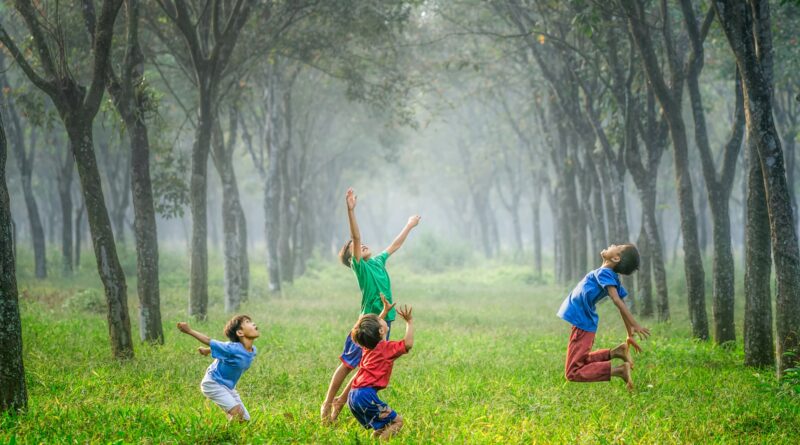Nurturing the Seeds of Wisdom:

“In the symphony of learning, education is the transformative melody that not only illuminates the minds of children but also orchestrates a harmonious future for our shared world.”
– Shree Shambav.
The Profound Impact of Education on Children and the Vision for a Better World
“In the symphony of learning, education is the transformative melody that not only illuminates the minds of children but also orchestrates a harmonious future for our shared world.” – Shree Shambav.
In the tapestry of human existence, education emerges as the golden thread, weaving a narrative of enlightenment, empowerment, and the promise of a brighter tomorrow. This journey begins in the formative years of childhood, where the seeds of knowledge are sown, and the roots of character take hold. Education is the cornerstone of a society’s progress, and when we talk about educating children, we embark on a journey that transcends classrooms and textbooks. It is a journey that delves into the depths of their hearts and minds, shaping not just individuals but the very fabric of our collective future. In this exploration, we unravel the profound importance of education for children, envisioning a world teeming with peace, compassion, empathy, and kindness—a haven for all living beings.
The Essence of Education
Embracing education is akin to cultivating a garden, each lesson a seed planted with care, destined to bloom into wisdom. In the nurturing embrace of knowledge, children become architects of a vision—a world adorned with the blossoms of peace, compassion, and understanding. As Nelson Mandela profoundly stated, “Education is the most powerful weapon which you can use to change the world.”
Empathy as the North Star
Beyond academic prowess, education instils a vital quality—empathy. Through stories, diverse perspectives, and shared experiences, children learn to understand, relate, and connect with the world around them. A well-educated child is equipped not only with knowledge but also with the capacity to appreciate the struggles and triumphs of others. In the words of Maya Angelou, “Do the best you can until you know better. Then when you know better, do better.” Education is the compass guiding us toward a world where individuals, armed with empathy, strive to do better for themselves and for humanity.
The Classroom as a Garden of Possibilities: In the metaphorical garden of education, teachers are the cultivators, and students are the blossoming flowers. An anecdote from the life of Maria Montessori, the renowned educator, resonates with the nurturing essence of education. She once observed, “The greatest sign of success for a teacher is to be able to say, ‘The children are now working as if I did not exist.’” This encapsulates the ideal educational environment—a space where children are empowered to explore, learn, and flourish independently.
Building Bridges of Understanding: Education acts as a bridge, connecting diverse cultures, perspectives, and ideologies. It dismantles the walls of ignorance, fostering unity in diversity. Kofi Annan captured this sentiment by stating, “Education is a human right with immense power to transform. On its foundation rest the cornerstones of freedom, democracy, and sustainable human development.” An educated society is equipped to navigate the complexities of global challenges, fostering collaboration, and understanding across borders.
Quotes as Beacons of Wisdom
“Education is the compass guiding children through the intricate landscapes of knowledge, compassion, and empathy, creating a vision for a world where the brilliance of their minds builds a tapestry of peace, kindness, and interconnected harmony.” – Shree Shambav.
The Ripple Effect of Knowledge
Consider the anecdote of young Maya, a girl from a marginalized community, who, against all odds, received an education. Maya’s story mirrors the transformative power of learning. As her knowledge grew, so did her community. The ripples of education reached far beyond her, creating a wave of positive change. Her journey illuminates the profound impact education can have on individuals and, subsequently, the world.
Forging a Path to a Sustainable Future
A Lesson from the Earth:
As children embark on the journey of education, they learn not only from textbooks but also from the greatest teacher of all—the Earth. Education teaches them the delicate dance of ecosystems and the importance of coexisting with nature. Albert Einstein’s words resonate: “Look deep into nature, and then you will understand everything better.” Through education, children develop a profound respect for the environment, becoming stewards of a sustainable future.
Respecting Nature’s Classroom: The canvas of education extends beyond the walls of schools, embracing the natural world as a profound classroom. Richard Louv, in his book “Last Child in the Woods,” coined the term ‘nature-deficit disorder’ to highlight the diminishing connection between children and the outdoors. Education must rekindle this bond, instilling not only environmental awareness but a deep-rooted respect for nature’s intricate ecosystems. As a famous Native American proverb wisely articulates, “Treat the Earth well. It was not given to you by your parents; it was loaned to you by your children.”
Cultivating a Garden of Values
Envision education as a well-tended garden, where the soil represents a fertile mind and knowledge the seeds. It is in this nurturing environment that values like empathy, kindness, and respect for diversity take root and flourish. Just as a well-tended garden yields a bountiful harvest, a mind enriched with education bears the fruits of a compassionate and enlightened society.
Education is a beacon that dispels the darkness of ignorance. It is a metaphorical sunrise, illuminating young minds and providing them with the clarity to discern right from wrong. In the words of Victor Hugo, “He who opens a school door closes a prison.” Education liberates minds, freeing them from the confines of ignorance and prejudice, paving the way for a just and equitable world.
Building Bridges, Not Walls
In a world often divided, education becomes the bridge that connects hearts and minds. It teaches children to build bridges of understanding rather than walls of prejudice. The legacy of Mahatma Gandhi encapsulates this idea: “You must be the change you wish to see in the world.” Education empowers children to become architects of positive change, influencing not only their lives but the lives of those around them.
A Visionary Blueprint for Tomorrow: The goal of education transcends individual success—it aspires to shape a collective vision for a better world. As Malala Yousafzai asserts, “One child, one teacher, one book, one pen can change the world.” Education is the key that unlocks the doors to a future where every individual contributes to the well-being of the planet and its inhabitants. In this vision, the legacy left for the coming generation is not just one of academic achievements but a world built on the principles of sustainability, inclusivity, and compassion.
Conclusion
In conclusion, education is the compass, the bridge, and the garden where the seeds of kindness, empathy, and understanding are sown. It propels humanity toward a future where every child, armed with knowledge and compassion, becomes a steward of peace and a custodian of nature. As we nurture the minds of the next generation, let us remember that education is not just a tool; it is the alchemy that transforms aspirations into realities and envisions a world where the colours of diversity paint a canvas of unity and understanding. Through education, we embark on a collective journey toward building a safer, more beautiful world for generations yet unborn.
Link: https://interviewtimes.net/the-profound-impact-of-education-on-children-and-the-vision-for-a-better-world/

